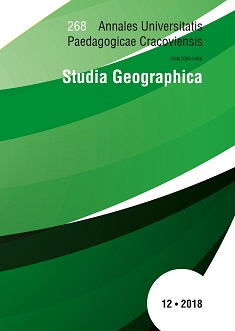Formative assessment in geography: students’ expectations in the new educational reality
DOI:
https://doi.org/10.24917/20845456.12.4Keywords:
education, geography, formative assessmentAbstract
One of the basic aims of education, including geographic education, was and still is to create conditions for the pupil to achieve success according to their abilities. For these purposes to be met, the roles and functions of the assessment should be interpreted correctly. Assessment is a difficult and complex competence. Its multidimensionality is related to the teacher’s skills and his knowledge of the goals and principles of assessment. In modern education, including geographical education, we can more and more often encounter formative assessment. This is a kind of assessment in which both the student and the teacher receive feedback on their learning progress. On this basis, the process of teaching and learning is assessed. In the opinion of many specialists and teachers, including geographers, this kind of assessment allows for more effective and more effective education. The student knows how to rationally overcome difficulties.
The study presents the results of surveys that covered the students of selected primary schools in Krakow (from September 2017, 8-year primary school) in September 2018. The aim of the study was to obtain students’ opinions on formative assessment and a look at the current assessment system in the light of changes in education. The obtained data allowed to show the formative assessment from the students’ perspective. Geography is the subject of teaching, in which not only the results of work are assessed, but also the contribution of work, interests and attitudes.
References
Bereźnicki F. (2007). Podstawy dydaktyki. Oficyna Wydawnicza Impuls: Kraków.
Black P., Harrison Ch., Lee C., Marshall B., William D. (2006). Jak oceniać, aby uczyć. „Biblioteka Akademii SUS”, Warszawa: Civitas.
Black P., Wiliam D. (1998a). Assessment and Classroom Learning. [w]: Assessment In Education: Principles, Policy & Practice, nr 5/1, 7–74.
Bloom B. S., Hastings J. T., Madaus G. F. (1971). Handbook on Formative And Summative Evaluation of Student Learning. New York: McGraw-Hill.
Brookhart S. (2009). Editorial, Educational Measurement: Issues and Practices. No. 1.
Brophy J. (2002). Motywowanie uczniów do nauki. Warszawa: Wydawnictwo Naukowe PWN.
Bruner J. (2006). Kultura edukacji. Kraków: Universitas.
Brzezińska A. i Misiorna E. (1998). Ocenianie opisowe w edukacji wczesnoszkolnej. Poznań
Cardinet, J. (1989). Evaluer sans juger. [w]: Revue Francaise de Pedagogie. nr 88, 41–52.
Encyklopedia Pedagogiczna. (1997). (red). W. Pomykało. Warszawa: Fundacja ,, Innowacja”, 463.
Legendre R. (1993). Dictionnaire actuel de l’Education. Montreal: Guerin.
Nicols P.D., Meyers J.L., Burling K.S. (2009). A Framework for Evaluating and Planning Assessments Intended to Improve Student Achievement. Educational Measurement: Issues and Practices, No. 3.
Niemierko N. (2010). Między prawdą a skutecznością – perspektywy oceniania szkolnego, [w:] B. Niemierko, M. K. Szmigel (red.), Teraźniejszość i przyszłość oceniania szkolnego. Teraźniejszość i przyszłość oceniania kształtującego, Kraków: GRUPA TOMAMI.
Sadler R. (1989). Formative Assessment and the Design of Instructional Systems. [w]: Instructional Science, nr 18, 119–144.
Sadoń- Osowiecka T. (2010). Funkcje oceniania według studentów- przyszłych nauczycieli geografii. Refleksje dydaktyka przedmiotowego, [w:] Teraźniejszość i przyszłość oceniania szkolnego, Uniwersytet Gdański, 589–594
Scriven M. (1967). The Methodology of Evaluation. [w]: R. Tyler, R. M. Gagne, M. Scriven, (red.), Perspectives of Curriculum Evaluation. Chicago: Rand Mac Nally, 39–83.
Sterna D. (2014). Uczę (się) w szkole. Warszawa: Centrum Edukacji Obywatelskiej.
Stróżyński K. (2010). Ocenianie kształtujące w polskiej szkole, [w:] B. Niemierko, M. K. Szmigel (red.), Teraźniejszość i przyszłość oceniania szkolnego. Teraźniejszość i przyszłość oceniania kształtującego, Kraków: GRUPA TOMAMI.
Szyling G. (2008). Strategia przejścia czy przetrwania? Czyli dokąd zmierza ocenianie szkolne, [w:] D. Klus-Stańska (red.), Dokąd zmierza polska szkoła?. Warszawa: Wydawnictwo Akademickie ŻAK.
Downloads
Published
Issue
Section
License
The submission of a paper to be published is synonymous with an agreement to transfer the copyright free of charge from the author to the publisher. The author also agrees to permit the publisher to publish the paper in printed form, open access online form, digital library form and other digital platforms with which the publisher has or will have a publishing agreement. Furthermore, the author agrees to not limit the number of copies that may be printed or issued by the publisher. In the case of co-authored papers, it is assumed that the corresponding author is authorized to represent the remaining co-authors in this respect. Authors are requested to sign a copyright declaration.

